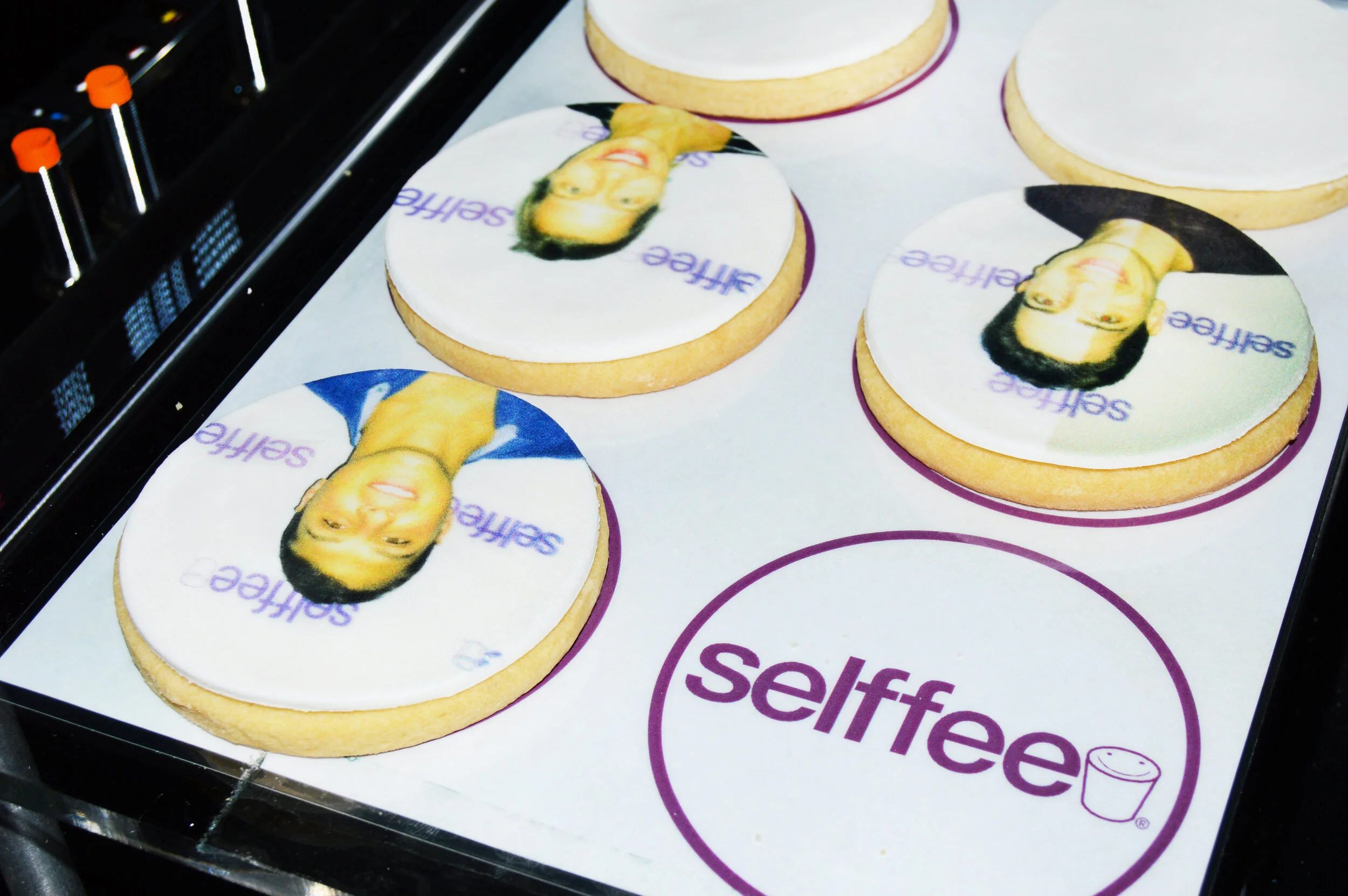Instant Edible Selfie Cookie is The new Party photo booth
One Management partygoers pose with their Selffee cookies at The Mailroom in New York City. Photo: Nina Roberts
Published in Forbes on September 21, 2017
Last week a party raged at The Mailroom, a new basement lounge on Wall Street in lower Manhattan. The modeling agency One Management was throwing a bash; leggy models and their colleagues sipped drinks and cavorted. An incongruous four-person team that could have been mistaken for house painters, clad in all-white overalls, worked in front and behind a large seamless screen with the logo “Selffee” in repeat.
Selffee is new startup that aims to eat its predecessor, the rented photo booth. This creative, tech-savvy iteration combines two current obsessions: selfies and food, with a dash of instant gratification. Similar to photo booths rented for events, Selffee let’s partygoers take a selfie with a provided smartphone and five minutes later their image appears atop an edible butter cookie or latte foam.
Launched just last year, Selfee is co-founded by Canadian Farsh Kanji and native New Yorker David Weiss. And yes, they use the D-word. They want to “disrupt” the rented photo both industry, as they claim it’s “played out” and “boring.”
Indeed, Selffee cookies truly delighted partygoers at The Mailroom, a blasé attitude wasn’t to be found as an eager crowd formed around the Selffee set up. One woman squealed, “I can’t eat this!” as she admired her Selffee cookie. Others took enthusiastic selfies with their Selffee cookies. Even veteran partiers were not immune, like lawyer Dan Neveloff who’s seen every party gimmick in the book since his Palladium and Cat Club days of the 1980s. “I’m not just taken,” Neveloff asserted, clutching his Selffee cookie sheathed in protective plastic, “I’m amazed!”
Selffee co-founder Farsh Kanji takes a moment from working an event to pose with One Management partygoers. Photo: Nina Roberts
Kanji and Weiss managed the growing crowd; Kanji behind the seamless screen, helping one employee on a laptop, loading and unloading cookies into their special printers. Weiss interacted with the guests, taking photos (they sometimes have to opt for “you-ies” as opposed to selfies for expediency) dancing for a few seconds in between guests to the blasting 80s disco music.
Weiss, who is slightly prone to hyperbole, calls the duo the classic odd couple; he’s “pseudo–manic,” and Kanji “slow and steady.” Weiss notes he’s more “touchy feely” that Kanji, and loves to periodically plant a kiss on Kanji’s bald head. “He hates it!” laughs Weiss.
Did Kanji and Weiss meet at a tech event? An accelerator? School? Are they childhood friends? No, they met at a silent meditation retreat in Thailand in early 2016. “Everyone thinks we made it up,” says Kanji of their unlikely meeting, “it’s a real story.”
At the time of the retreat, both were at professional crossroads. Kanji, 36-years-old, is a chiropractor and had recently sold his 11-year wellness clinic in Calgary, Alberta, because he was ready to leave the city. Weiss, 28-years-old, had quit his job at the family “schmatta” business, as he calls it, six months prior. Weiss happened to be in Thailand, attending a folk music festival, and a Dutch couple suggested the retreat. “It has a seemingly janky name, like, monkchat.net,” recalls Weiss. “What is this?” he remembers thinking, “a 1990s internet scheme?” but went spur of the moment.
Weiss chose Kanji as a roommate. “He’s just got the look and the vibe,” explains Weiss, who was particularly intrigued by Kanji’s big bushy beard, noting it’s now 60% of its previous size.
Both have unusual cultural heritages. Kanji is of Indian decent with three generations living in Tanzania before his parents immigrated to Canada; Weiss is half Southern Baptist, half Jewish. “Oh, yeah,” says Weiss proudly, “Farsh and I are the least basic people I think I’ve ever met.”
Selffee cookies hot off the press. Photo: Nina Roberts
After the retreat they traveled together, Kanji realized his roommate was a “cool guy.” They started talking about business ideas, which rapidly lead to the Selffee concept. Weiss remembers thinking, “This is somebody I would get in business with,” he adds, “We just have the exact same moral code.”
They didn’t return to their respective homes to regroup and ponder Selffee. “Oh no,” says Kanji, “It was like, ok, this is real, let’s keep going.” The two traveled to Malaysia, China, Japan and Indonesia, researching the technical aspects of Selffee, contacting printer manufactures, engineers and developers.
Sellffee is based in New York City. Kanji who now lives in Toronto, travels back and forth frequently, as he waits for his U.S. visa. “I’m on the edge of my seat,” says Kanji, “now that’s the business is really taking off.”
Their first corporate gig was for the makeup company Glossier; they have since worked events for Twitter, Google, Crayola and American Airlines, among others, around the U.S. and beyond. Selffee also does pop-up events, bar and bat mitzvahs, birthday parties, and have a goal of working one charity event per month, their most recent was a Dystonia function at the Bronx Zoo. They have been hired for trade shows, not only does Selffee get people in a brand’s booth, but it also provides a captive audience while customers wait five minutes for their Selffee cookie or latte. Selffee’s fees are case by case, based on travel time and the number of expected event attendees; it’s approximately $10 to $25 per person, contingent on group size.
Kanji and Weiss have been bootstrapping, invested their own money, which includes the use of credit cards. A successful Indigeogo crowdfunding campaign in late 2016 yielded just over $30K and they recently completed an additional friends and family round of funding. Neither co-founder has paid themselves since Selffee launched. “Every dime we make we put back in,” says Weiss, who doesn’t think it’s a sacrifice because he says they’re both minimalists. “The last thing I bought in the last three months is socks and toothpaste,” claims Weiss.
There are similar custom photo-based edibles on the market, from cakes topped with life-like portraits to cafes using the Ripple Maker machine, which produces custom prints on latte foam. But Selffee’s proprietary software, patent pending, is what makes their product unique. “Our technology allows this process to happen a lot quicker,” says Kanji, “that’s why we can execute at an event.”
Selffee is Kanji and Weiss’s first foray into the tech sector. Weiss notes that his former industry, apparel, is dying. Meanwhile, tech is exploding with possibilities. “We’ve just really embraced it,” says Weiss of the tech world, “we’re always trying out new tools, utilizing different systems to keep us copacetic.” Kanji does miss a component of healing people, but says Selffee does bring joy to people and it’s also fun for him.
Is Selffee adding fuel to the narcissistic fire we find ourselves living in? “Oh yeah,” laughs Kanji, “there’s this new vanity, it’s there.” But they’ve embraced the culture’s current obsession with self and everyone is in on the joke. Selffee is just taking it one step further; people can now eat themselves too. And similar to the photo booth, Sellfee appeals to all ages and walks of life. “When we think 90-year-old grandpa is sleeping at the bar mitzvah,” says Weiss, “he gets up and he’s loving the cookie.”


